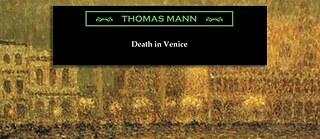Goethe Book Club
Goethe Book Club Goes Digital: Thomas Mann's Death in Venice (1912)

The Goethe Book Club is going digital!
Read and discuss works by contemporary German authors in this series hosted by the Goethe-Institut. All books can be read in their English translations or in the German originals; our discussion will be in English. Led in June by guest facilitator Raleigh Joyner, Goethe-Institut Washington’s program coordinator, this special „throwback“ edition of Goethe Book Club revisits Thomas Mann’s 1912 classic and controversial novella Death in Venice.
Please Note: In order to participate in the online discussion (carried out over Zoom), registrants must obtain access to the novella Death in Venice / Der Tod in Venedig on their own. Hard copies of the novel can be ordered through multiple vendors online; the eBook is also available for download to Kindle, iPad, and other digital reading platforms. A limited number of eBook and audiobook editions of the original German edition and its English translation can also be found on Goethe's Onleihe, the eLibrary of the Goethe-Institut.
---------
Death in Venice / Der Tod in Venedig (1912) by Thomas Mann, translated by Kenneth Burke (1925), H.T. Lowe-Porter (1928), Michael Henry Heim (2005)
Renowned writer Gustav von Aschenbach is trapped in the doldrums. A widower who leads an ascetic and rigidly structured life in early-1900s Munich, his days are defined by writing, naps, and long walks. But he begins to unravel when his writer’s block and midlife crisis collide, leading him to go on holiday in Venice. There, as a cholera epidemic and the mysterious sirocco winds descend on the sultry Italian city, Aschenbach develops a dangerous obsession with a young Polish boy staying at his hotel. As he pursues the object of his fixation through the increasingly sinister streets of Venice in summertime, the severe and no-nonsense writer loses all sense of himself. As the title might suggest, none of this can possibly end well…
RSVP
Thomas Mann was born 1875 in Lübeck to a highly-educated upper-middle-class Hanseatic family. His mother was a Catholic Brazilian woman of Portuguese, South American Indian, and German ancestry; this fascination with his "Southern" heritage featured prominently throughout Mann’s writings. Mann studied history, economics, art history, and literature at the Ludwig Maximilians University of Munich and the Technical University of Munich. His first novel, Buddenbrooks, was published in 1901. In 1929, Mann was recognized with the Nobel Prize for Literature, primarily due to this novel. Mann’s other works include The Magic Mountain (Der Zauberberg) in 1924 and Doctor Faustus in 1947. A prolific writer of long fiction, short fiction, lectures, and essays, Mann is considered perhaps the most influential German writer to emerge from the 20th century. After living and working in exile in the United States throughout World War Two, Mann settled in Switzerland in 1952. He lived the rest of his life there, and died in Zürich in 1955.
Guest facilitator Raleigh Joyner is the program coordinator at the Goethe-Institut Washington, where he curates much of the film and literature programming. He holds an M.A. in Germanic Studies from the University of Maryland, College Park. His thesis explored how Germany’s history shaped the 20th-century landscape of Berlin and its subcultures, and his second research area focused on the writings of the Mann family. He holds a B.A. in Germanic Studies and a B.A. in English Language & Literature from UMD. His English literature studies focused on 20th-century literatures of the American South, creative writing, and folklore.
Details
Zoom
Language: English
Price: Free Admission
+1 (202) 847-4700
program-washington@goethe.de
Part of series Goethe Book Club 2019-2020